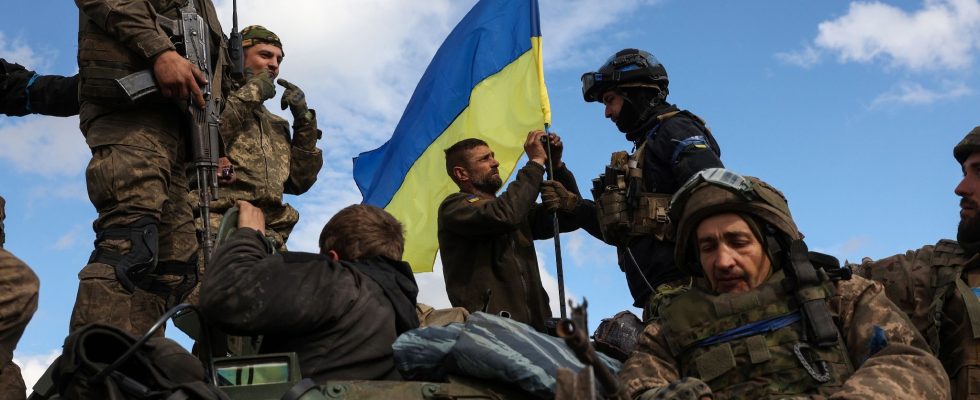“Our soul cannot die/Freedom never dies.” Did General Oleksandr Syrsky remember these verses by Taras Shevchenko, known to everyone in Ukraine? It was a few meters from a statue of the poet and national hero, on whose arm a flag with yellow and blue stripes flapped in the wind that day, that the commander of the land forces greeted in a rare video the liberation at the beginning of September from Balaklia, east of Kharkiv. “It will not be the last city we will liberate”, he prophesied then, a few days before his troops drove out the Russians from Izium and Kupyansk.
Like his superior, Chief of Staff Valery Zaloujny, General Syrsky has established himself as one of the figures of resistance to the invasion launched on February 24, 2022 by Vladimir Putin. For the Russians, he is the strategist to be beaten, the one who inflicts the most painful defeats on them. For the Ukrainians, he is the hero who will lead a long-awaited counter-offensive. “I have known him personally for a long time, he is one of the most capable generals, respected by all, very good at planning and operational implementation,” said former Defense Minister Andriy Zagorodnyuk.
Born in 1965, Oleksandr Syrsky has the advantage of knowing how his Russian counterparts work, with whom he trained as an officer in Moscow, before the collapse of the Soviet Union. “He is totally different from them, from their very hierarchical vision, continues Zagorodnyuk. Like Zalouzhny, he is someone who listens to others, contrary to the Soviet mentality of a few years ago, which still prevails in Russia. .” This approach enabled it to play a major role, from 2013, in the conversion of the Ukrainian army to NATO concepts, advocating more autonomy in decision-making.
Rare reviews
His service records match the great military successes of the Ukrainians. In the early days of the war, he led the safeguard of the capital against an overwhelming number of opponents, the bulk of the troops then being on the Donbass front. “Only two units and several battalions made up the defense of kyiv,” said the 57-year-old officer. To strengthen it, he then draws on the material and human resources of military schools. He also takes advantage of the information transmitted by the civilians to bleed the convoys of the Russians, forced to withdraw at the end of March: “They made it possible to adjust the fire of our artillery, often at the risk of their lives”.
Five months later, the general inflicted a new stinging defeat on the Russian army, in the Kharkiv region, thanks to a surprise breakthrough with brigades regrouped at the last moment to deceive Moscow. “The Izium operation was prepared as a false attack in order to distract Russian attention from the main offensive,” he told the World. Then it became a real attack.” In fact, the Russian army plucked its Kharkiv front too much, imagining a Ukrainian maneuver only in the direction of the city of Kherson, from which it also had to withdraw.
This double masterstroke is as much that of General Syrsky as of his teams. “In this kind of operation, the leader conceptualizes what he wants, his teams offer him plans and in the end, he decides,” explains researcher Thibault Fouillet, from the Foundation for Strategic Research. For this he has the support of his superior, General Zaloujny: “I have confidence in Syrsky, if he tells me that he needs an additional brigade, he explained to The Economist in December, that means he really needs it.”
More than a dozen of them have been equipped – some with Western armor – and trained in recent months to carry out the next counter-offensive, according to recently leaked classified American documents. All the difficulty, for General Syrsky, will consist in surprising the Russians again. But their defenses will be denser than before, near Kharkiv. “We will have to create deception maneuvers [NDLR : tromperie] different, believes Thibault Fouillet. The Ukrainians could surprise the Russians by concealing the priority axis of their efforts.”
Few dare to criticize him, even if some Ukrainian observers contacted by L’Express wonder about the number of deaths among his men, during Debaltseve’s retreat in 2015, during the secession of part of Donbass . Or in recent months in Bakhmout, conquered meter by meter by the Russians, at the cost, however, of heavy losses. “We have to gain time to accumulate reserves and launch a counter-offensive, which is not far off,” he explained. If it allows the occupied territories to regain their freedom, General Syrsky would see his name engraved in the history of his country.
